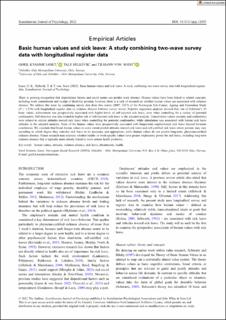| dc.contributor.author | Løset, Gøril Kvamme | |
| dc.contributor.author | Hellevik, Tale | |
| dc.contributor.author | von Soest, Tilmann | |
| dc.date.accessioned | 2022-12-21T10:17:03Z | |
| dc.date.available | 2022-12-21T10:17:03Z | |
| dc.date.created | 2022-07-08T17:16:21Z | |
| dc.date.issued | 2022-07-07 | |
| dc.identifier.citation | Scandinavian Journal of Psychology. 2022, . | en_US |
| dc.identifier.issn | 0036-5564 | |
| dc.identifier.issn | 1467-9450 | |
| dc.identifier.uri | https://hdl.handle.net/11250/3038986 | |
| dc.description.abstract | There is growing recognition that dispositional factors and social norms can predict work absence. Human values have been linked to related concepts, including work commitment and receipt of disability pension; however, there is a lack of research on whether human values are associated with sickness absence. We address this issue by combining survey data from two waves (2007, 2017) of the Norwegian Life-Course, Ageing and Generation Study (N = 1,330) with longitudinal register data on sickness absence between survey waves. Stepwise regression analyses showed that, out of Schwartz’s 10 basic values, achievement was prospectively associated with higher levels of self-reported sick leave, even when controlling for a variety of potential confounders. Self-direction was also related to higher risk of self-reported sick leave in the adjusted analysis. Conservation values (security and conformity) were related to stricter attitudes toward sick leave when controlling for potential confounders, while stimulation was associated with lenient sick leave attitudes in the adjusted analysis. None of the human values were prospectively associated with longer-term register-based sick leave beyond bivariate correlations. We conclude that broad human values to some extent predict attitudes toward sick leave and self-certified sick leave where persons may vary according to which degree they consider sick leave to be necessary and appropriate, while human values do not predict long-term, physician-certified sickness absence. Future research may examine whether health- or work-specific values have greater explanatory power for sick leave, including long-term sickness absence that is typically more closely linked to more serious health problems. | en_US |
| dc.language.iso | eng | en_US |
| dc.publisher | Wiley | en_US |
| dc.relation.ispartofseries | Scandinavian Journal of Psychology;Volume 63, Issue 6 | |
| dc.rights | Attribution-NonCommercial-NoDerivatives 4.0 Internasjonal | * |
| dc.rights.uri | http://creativecommons.org/licenses/by-nc-nd/4.0/deed.no | * |
| dc.subject | Human values | en_US |
| dc.subject | Attitudes | en_US |
| dc.subject | Sickness absence | en_US |
| dc.subject | Sick leave | en_US |
| dc.subject | Absenteeism | en_US |
| dc.subject | Health | en_US |
| dc.title | Basic human values and sick leave: A study combining two-wave survey data with longitudinal register data | en_US |
| dc.type | Peer reviewed | en_US |
| dc.type | Journal article | en_US |
| dc.description.version | publishedVersion | en_US |
| dc.rights.holder | © 2022 The Authors | en_US |
| cristin.ispublished | true | |
| cristin.fulltext | original | |
| cristin.qualitycode | 1 | |
| dc.identifier.doi | https://doi.org/10.1111/sjop.12855 | |
| dc.identifier.cristin | 2037760 | |
| dc.source.journal | Scandinavian Journal of Psychology | en_US |
| dc.source.volume | 63 | en_US |
| dc.source.issue | 6 | en_US |
| dc.source.pagenumber | 658–669 | en_US |
| dc.relation.project | Norges forskningsråd: 288083 | en_US |
| dc.relation.project | Norges forskningsråd: 237993 | en_US |

